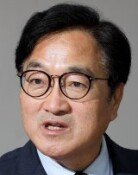U.S. Urges N. Korea to Return to the Six-party Talks within This Year
U.S. Urges N. Korea to Return to the Six-party Talks within This Year
Posted November. 10, 2004 23:21,
The U.S. government made it clear for the first time after the presidential election that it plans to maintain the previous administrations North Korea policy concerning the nuclear issue, saying, (The U.S.) will not negotiate directly with North Korea but will continue to avail itself in the frame of the six-party talks.
Assistant Secretary of State James Kelly (pictured), who is in charge of the Bureau of East Asian and Pacific Affairs, at a seminar held at the Woodrow Wilson Center in Washington D.C. yesterday urged, As the U.S. presidential election is over, North Korea should listen to the constituents of the six-party talks and come back to the talks as soon as possible, and if possible, within this year.
Subsequently, he stressed the importance of continuing with the six-party talks, saying, The U.S. could not stop North Koreas nuclear program, but it established a frame called the six-party talks as the best wish for its solution.
Kelly also spurned the Democratic Partys argument that bilateral talks between North Korea and the U.S. could precipitate a solution. He stated, To make North Korea stand by international commitments and obligations, the principle of multilateral diplomacy (which increases the burden for the North to fulfill an agreement by making the promise to several countries) is the best, and the U.S. is not considering bilateral talks without the participation of neighboring nations.
Such a remark by Kelly is a reconfirmation of the previous principle to avoid experiencing the failure of the Agreed Framework, the result of direct negotiations between North Korea and the U.S., in which it was revealed to the public in October 2002 that North Korea secretly promoted nuclear programs using enriched uranium.
To the question, Didnt bilateral contact (to widen the understanding albeit informal) between North Korea and the U.S. take place within the six-party talks itself?, he replied, There is no change of including all types of individual talks in the six-party talks.
North Korea has been objecting to the fourth six-party talks agreed to be held in the end of September.
So far, North Korea has been setting forth conditions for its return to the six-party talks: the discontinuation of hostile North Korea policy of the U.S.; the resolution of Koreas nuclear test issue; and the principle of freeze to compensation in which the U.S. and the other parties provide energy and promise the security of the North Korean regime on paper if North Korea freezes (not dismantle) its nuclear programs.
Meanwhile, the floor leader of the House of Representatives, Nancy Pelosi, a Democrat who has been arguing for bilateral talks between the North and the U.S. during the presidential election, stressed to the press, Multilateral talks is necessary, but if breakthroughs can be achieved by bilateral talks, its possibility should not be excluded.
Seung-Ryun Kim srkim@donga.com







